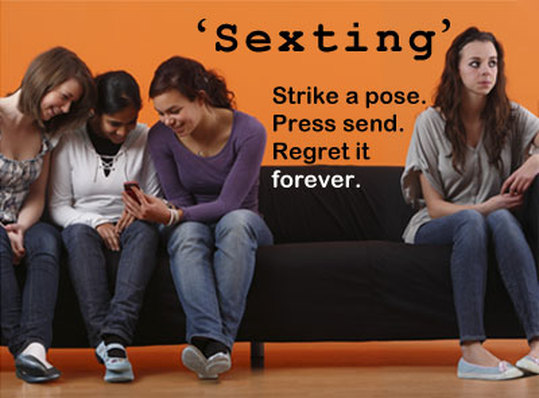High School Sexting Scandals The New Normal
Nude photos of hundreds of students in one Colorado high school are being distributed.
A NYT report titled “Hundreds of Nude Photos Jolt Colorado School” is trending on social media. It’s likely being fueled by the over-40 set.
At least 100 students at a high school in Cañon City traded naked pictures of themselves, the authorities said Friday, part of a large sexting ring.
The revelation has left parents outraged, administrators searching for missed clues, and the police and the district attorney’s office debating whether to file child pornography charges — including felony charges — against some of the participants.
George Welsh, the superintendent of the Cañon City school system, said students at Cañon City High School had been circulating 300 to 400 nude photographs, including images of “certainly over 100 different kids,” on their cellphones. “This is a lot of kids involved,” he said, adding that the children in the pictures were believed to be students at the high school as well as eighth graders from the middle school.
Members of the high school football team, the Cañon City Tigers, were at the center of the sexting ring, Mr. Welsh said. On Thursday night, separate community meetings were held for parents of football players and parents of other students to address the scandal, which has shocked this quiet, semirural community of 16,000. The team was forced to forfeit its final game of the season.
Because it is a felony to possess or distribute child pornography, the charges could be serious. But because most of the people at fault are themselves minors and, in some cases, took pictures of themselves and sent them to others, law enforcement officials are at a loss as to how to proceed. “Consenting adults can do this to their hearts’ content,” said Thom LeDoux, the district attorney, but “if the subject is under the age of 18, that’s a problem.”
He added that he was not interested in arresting hundreds of children and would “use discretion” if he decided to file charges.
Mr. Welsh said a significant percentage of the student body at Cañon City High School had participated, with boys and girls involved in seemingly equal numbers. The photo-sharing, some of which took place in school, was done largely on cellphone applications called “vault apps” that look innocent enough — some look like calculators — but are really secret troves of photographs accessible after entering a password.
As the father to two little girls, I dread a future in which this sort of behavior will stop shocking the community. Today’s high schoolers have no recollection of a time before smartphones and ubiquitous cameras with high resolution video that can be instantly uploaded to any number of social media sites. The combination of this technological shift and a willingness to be photographed in compromising situations that I can’t fathom makes scandals of this sort not so scandalous.
Indeed, even sitting on the precipice of 50, my first instinct on reading that the football team was being forced to forfeit their final game over this incident is that the punishment didn’t fit the crime. There’s no obvious connection to football or, indeed, to academics here.
Further, the notion that teenagers distributing photos of other teenagers who willingly posed for photos or videos constitutes “child pornography” is bizarre. Boyfriends being charged with crimes for possessing nude photos of their girlfriends strikes me as absurd at best and outrageous at worst.
Now, the distribution of photographs that were intended for the private enjoyment of then-boyfriends and girlfriends for malicious purpose is another thing, but that’s true regardless of the age of those involved. The phenomenon of revenge porn is disturbing and obviously one that should be cracked down upon by our legal system. But I’m afraid that much of the scandal described in the NYT story is merely “teenagers being teenagers” in the digital age.







The phenomenon of sexting among teenagers is certainly a problem, one created largely because it’s clear that the kids don’t fully understand the consequences of sharing things digitally and how nothing is ever truly deleted. Perhaps as this technology becomes more ubiquitous it’s something that even younger people will become more self-aware of, perhaps things will change when people who grew up with the technology themselves become parents. Ultimately, the kids need to understand that there are just some things you don’t share online, or even privately. I can’t say I know how you accomplish that, though.
Whatever the solution is, though, it’s obvious as you say that handling this via law enforcement isn’t the answer. I’ve written before about the absurd lengths that such prosecutions have gone in states like Virginia, North Carolina, and Illinois, but all you really need to do is search Google and find example after example. Whatever this is, it’s not “child pornography,” nor is it something that should result in teenagers being required to register as a sex offender, a status that would have disastrous consequences for their adult lives before they’ve even started.
The real question is, will there be some ambitious prosecutor who’ll take a tough-on-morality stand and prosecutes them all as felons. Nothing to help with future life like a felony record and lifelong sex-offender registration, to protect the good kids of course. Luckily it’s Colorado where that approach is probably not a stepping stone to statewide office.
@Mu:
Read the links in my comment above, that’s exactly how several prosecutors have approached these types of cases, at least initially. Fortunately, in several cases that I’ve followed over the years they have ended up stepping back from the brink but, nonetheless, prosecuting these teens as felons and threatening to brand them as sex offenders before they’re even old enough to vote or sign a valid contract strikes me as utterly absurd.
I have not researched this type of activity, but it seems like it is growing. I know that most service providers have parental guards, filters, and protections that can be set. Parents can and should monitor every day the activities of their children. The service providers, and even the police can help show parents how to set these up and use them. School guidance counselors should have meetings to discuss these sort of things with the parents, students, and phone service representatives. Even judges should come and talk to the students about the legal ramifications of this sort of thing.
Churches, especially, should take the lead on this, hold community meetings, and have some serious sessions, heart to heart talks, and lessons about this behavior and morality. This is not just some fad, “boys will be boys”, innocent playing deal here.
Finally, these young people and parents need to be aware that this is one way that sex offenders, predators, and kidnappers use to get entry into a person’s private information, gain their confidence, and then strike.
I am not sure what could be done, but it seems that some sort of laws and legislation should be looked at.
“As the father to two little girls, I dread a future in which this sort of behavior will stop shocking the community.”
I’m not a father, but I actually look forward to the future in which this sort of behavior will stop shocking the community — which will happen once this generation reaches middle-age and every adult in power will have this in their past. Teenagers have sex, teenagers smoke dope, teenagers experiment with the world, and every generation — all of whose members did the same things — finds the current iteration to be far more shocking than whatever they did.
The problem here is really not with the kids…
As the father to two little girls, I dread a future in which this sort of behavior will stop shocking the community.
But I’m afraid that much of the scandal described in the NYT story is merely “teenagers being teenagers” in the digital age.
While I can appreciate the problems with this topic and how to proceed–I, too, am at a loss to know what to do–the fact of statement two will create the situation of statement one. I don’t think statement two will get us to where we want to go.
I think actually it may be us old people who don’t understand. The technology defines the new normal. I’ll do all I can to stop my teen-age daughter doing this, but if it happens it really isn’t the end of the world.
@michael reynolds:
I agree, but I also don’t think that the teens understand what the technology does or that sharing something privately in a digital format doesn’t mean it will remain private. In an era where employers, university admissions departments, and even potential love interests routinely search google and social media to find things out about people it’s increasingly hard for anything to remain truly private unless you keep it to yourself.
Ful disclosure: a few short years ago I had the pleasure of parenting two daughters through those wonderful high school years, so yes, I had the same general concerns about dating and sex that almost every normal parent had/has.
Unfortunately I think we’re about to have a morality binge over this incident. These kids are about to be run through a gauntlet of public shame and scorn, and possibly subject to criminal charges and god knows what else. Some may have their lives ruined for a few years because of this. Those sexted pictures are out there now, too late to change that.
We are a strange country these days – we emphasize sex in so much of what we sell, and yet we pretend to be surprised when some high school kids exercise poor judgment and sext pictures of themselves to friends, boyfriends, and girlfriends. Then we predictably head down the Scarlett Letter Road.
But really, the lesson that these kids will learn, is that we, all offs, should by now be fully aware that in our digital world nothing is ever permanently deleted. Every post, every photo seemingly has a shelf life of decades, probably much much more. Perhaps that – the lack of privacy in the digital world – is what we should be talking about, not over-emphasizing the sexting of photos by hyper-hormonal high school teens.
What is disturbing in these cases is that society, in the name of not letting these kinds of things ruin kids’ lives end up, via draconian laws, doing just that.
@Steven L. Taylor:
Exactly. It’s circular logic. “We have to ruin your life so that you will learn that this will ruin your life.”
@Doug Mataconis:
I think the social and moral consequences are already mostly gone. The older generations tut-tut this, and feel superior and smarter, but don’t really hold it against the youngsters. When doing a quick Google of someone for give or take any reason, a report of a naughty picture or two is going to cause way less of a problem than a teenaged bought of racism or libertarianism.
The only problem with consequences is the law.
@Gustopher:
You don’t think that a nude, partly nude, or even just a “glamour” shot or bikini photo of a teenage girl that she sends to her boyfriend that he then shares with others is going to embarrass her extremely at the very least?
@Doug Mataconis:
That depends on the picture and the person.
A lot of ‘glamour’ shots, bikini pics and partly nude pics and more rarely nude images are regularly being put up on social media and made available to all connected by people of all ages. This probably includes more teens than any other group, only 20 somethings might overshadow them. It is stupid, but the sheer ubiquity of it probably means that when they grow up having a few nudes or near nudes floating around the internet will mean about as much as having smoked pot in high school or college.
I am by no means recommending the behavior in question, but I do wonder that once we get to the point where a large percentage of the population has lived much of its life online that the impact of these photos won’t diminish to some degree.
@Grewgills:
@Steven L. Taylor:
You both make good points, and I’m certainly not saying we need to be prudish about this. SImply suggesting that it does seem like these kids aren’t thinking this through when they do stuff like this. Shocking, I know.
@Doug Mataconis: Agreed.
@Doug Mataconis: being embarrassed isn’t a huge consequence. If you aren’t embarrassed by who you were and what you did in high school, you’re either some iron-willed sociopath, or you’re rewriting your own history and believing it, or you are still a child.
Is a nude picture, if everyone was doing it (which they seem to be), more or less embarrassing than your political views as a fifteen year old? Or your haircut. Or that boyfriend/girlfriend you should have known better than to date?
If the nudie pic is more than just tame, maybe more embarrassing (“Wow, with a marshmallow?” “sigh. I don’t want to discuss it, and the llama just happened to walk into the living room at the wrong moment…”), but generally, probably not. It doesn’t speak to your character, your lack of empathy, the things you did that hurt other people, or any of the things that you would really have cause to regret.
@Gustopher:
If all of this ends up with a culture where the stigma attached to the photos is lessened or eliminated, that’s on the whole probably a good thing. I’m just suggesting that, today, we still live in an environment where that isn’t necessarily the case.
Also, even if we reach the point where that stigma is reduced photos like this also get back to the issue of teenagers playing with fire when it comes to sex itself. Yes, that’s been happening since time immemorial, but it’s still something for parents to consider, and why they should try to be aware of what their kids are doing online, no?
@Doug Mataconis: At least the kids haven’t figured that out their phones can take videos. Because when that happens, well, wrists will be strained from all the handwringing.
Let’s all agree to not tell them.
I mean, seriously, there isn’t a widely reported mass epidemic of teenagers sharing videos of themselves performing sex acts, but the technology is right there. The sharing is slightly harder, but very doable. The kids are thinking about the consequences more than you assume they are, they are just drawing the line between acceptable and unacceptable at a different spot.
@Gustopher:
That may be to “sex tapes” being a thing for a generation longer than nude selfies.
The problem here is one of discipline and authority. The parents can’t control the kids, the schools can’t take disciplinary action whenever there’s a felony, and prosecutors can’t call every cheerleader and football player on the school team a felon and lock their (mostly white) asses away forever.
On the IT side, I think both generations are confusing phones/the internet…phone conversations can be private between parties, but anything sent “online” is deemed to be out in the Wild West. Unless there’s new legislation to address these issues, they’ll continue to pop up.
@Tyrell:
Because the average kid today isn’t a lot more tech savvy than his or her parents or anything…
And you can get a phone with a camera dirt cheap today, so unless you want a law that only allows adult to purchase smart phones, or any kind of camera for that matter…
————————————–
I’d call that progress.
For those worried about your daughters doing this, do you have sons too, and if so, aren’t you worried about them doing this too? If not, then why not?
@Gustopher: I mean, seriously, there isn’t a widely reported mass epidemic of teenagers sharing videos of themselves performing sex acts
You’ve got the dynamic wrong. The nude photos are because they’re not having sex at that moment. That’s why these photos are usually selfies. It’s the visual version of sexting, which is the post-literate version of mash notes/love letters. It’s an attempt to establish/maintain intimacy with someone who isn’t around at the moment.
Taking a video of yourself or yourselves performing a sex act is about exhibitionism, which is kind of the opposite of intimacy.
Though following the logic in this thread, what would be the big deal if kids were doing amateur porn? The problem would just be us old fuddy duddys who don’t “get it.”
Mike
@Gustopher:
This.
Keep in mind that, unlike our generation(s), this generation has grown up with universal access to unlimited hardcore pornography from a very early age. (You did know that, right?) I suspect that this gives them a very different perspective on what counts as embarrassing or shocking.
In my day you needed access to a darkroom to do this sort of thing. … and I did 🙂
People should chill their cognitive dissonance when they remember when they were a kid and shake with horror because they expect kids to do all the @!$%# hole things they did with a Polaroid camera. Well Guess what; they are !! Stop arresting people for looking at their images and get over it; allow kids to explore their sexuality by living and learning. Nothing is perfect; so for those that are holier than thou do not let your angst control you. You can not Legislate sexuality they already tried it was called the Inquisition. There is one other solution and that is to take all cameras away from children under 18 year olds’ including cell phones. These are laws your politicians passed into law without any empirical proof and your responsible because you made them do it. These same Child P*** laws passed to protect children are now being used against them.
For all you bellicose individuals, CP can be found on anybody’s computer even yours if we confine ourselves to just the legal definition of CP. The CP concept is elusive because legal definitions of both “child” and “child pornography” differ globally and even among the United States.
David Finkelhor a sociologist who directs the Crimes Against Children Research Center at the University of New Hampshire who sees the moral weight of the current CP law, but not the empirical proof believes the LAW should be based on empirical proof. Shouldn’t there at least be a VICTIM?
http://www.truthmovement.us/2014/09/the-child-pornography-crusade-and-its.html
@MBunge: The big issue here is safety. There are predators out there roaming the internet in search of victims. They use false names and all kinds of traps to lure these young people into their snares. They know how to locate and then trail their victims. Young people need to be constantly aware of these dangers Parents need to closely monitor the activities and social sites that their children are using. Sending out photos is a big risk.
@Tyrell: You’ve never actually been more than five miles from home, have you?
Besides the negative publicity of the news stories and legal proceedings has there been any negative consequences or stigma to the many kids whom have done this over the last several years? It seems that if having sexting pictures more or less out there had such negative effects that we would have heard the parade of horribles follow on stories instead of “what if”.
Diets high in fat and protein are usually effective for people
in losing weight. After an Achilles tendon rupture, a player will
be able to walk flat-footed, but will not be able to stand up on his or her toes on the affected
side. Only a small percentage of the population is born with foot problems, the
American Podiatric Medical Association believes.